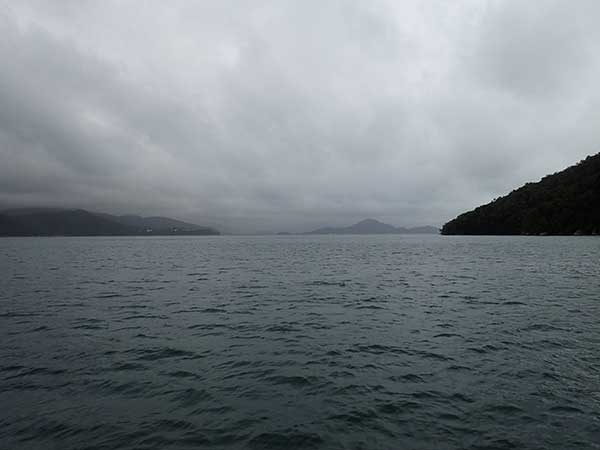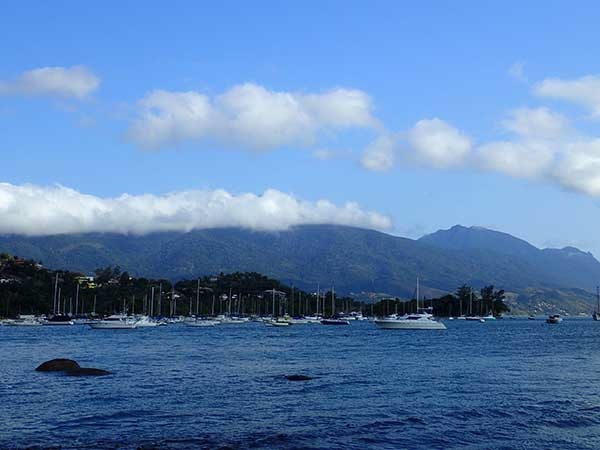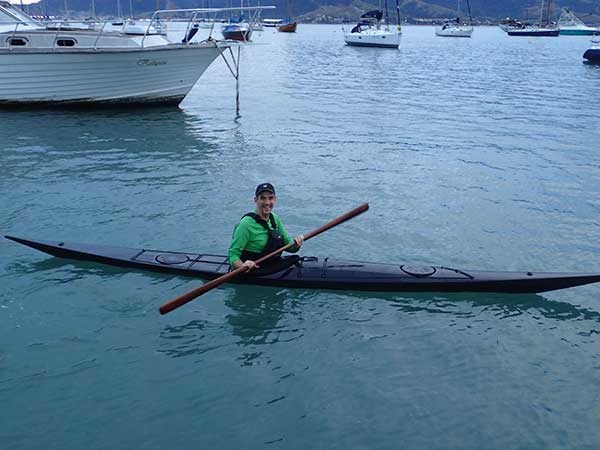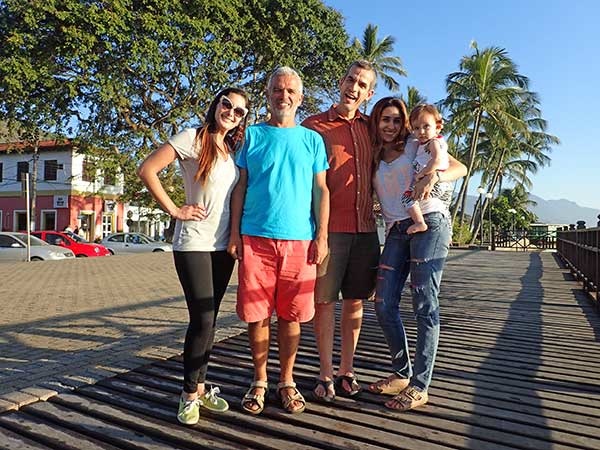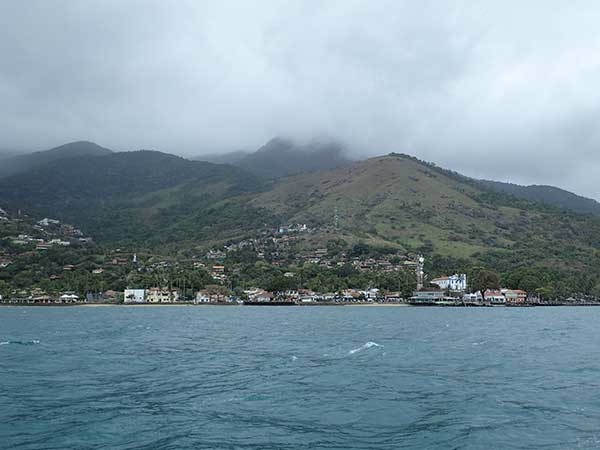Ilhabela - last stop in Brazil

Caramor - sailing around the world
Franco Ferrero / Kath Mcnulty
Sun 6 Sep 2015 20:59
The first reason for sailing as far south as Ihlabela was to admire the beautiful coastline of rainforest draped islands. When we woke up on the morning we were leaving Anchieta, the scenery outside our porthole was more reminiscent of Wales than tropical Brazil. Needless to say, we didn't see much other than dark hulking shapes looming in the fog.
São Paulo coastline shrouded in fog
The second reason was to meet Rony. A couple of months ago we received an email from him offering help of any sort, anywhere in Brazil. He is a sea kayaker and had heard about our trip from Barry and Justine. We took him up on his offer and arranged for our post to be sent to him.
We arrived early afternoon and picked up a mooring at Yacht Club Pinda. Much to our amazement and appreciation, we could stay for free for a week and use the facilities. We had been warned that the yacht clubs on Ilhabela were very expensive, so it was a pleasant surprise. Rony met us that evening and took us to the supermarket. He has been living on Ilhabela for four months, having moved there from Argentina with Sharia, his wife and baby daughter Emilia.
Yacht Club Pinda
Rony popped by in his kayak
We gave Rony a list of our requirements (he had offered!): laundry, sports massage and 10m of fire hose. Sharia very kindly did our laundry, his friend Gabriel is a physio and Gabriel's brother is a fireman and procured the hose. The hose will be used to protect Caramor’s ropes from chaffing when tied to a pontoon or to trees in the Chilean Canals.
We met up for lunch on the Sunday. Sharia’s sister Jordana is visiting for a month. She is a famous Columbian actress. We were fascinated by Sharia, Jordana and Ronny’s family backgrounds which epitomise the amazing cultural mix which is South America. Sharia and Jordana are Columbian, from Bogota. Their maternal grandmother was one of the first Columbian actresses, their mother was born in Argentina but returned to Bogota as a teenager, their father is from Lebanon. Rony’s grandparents were German peasants, they first moved to Russia but didn't like it so emigrated to Argentina. His parents later moved to Brazil. Rony and Sharia met in Argentina. Emilia is truly South American!
Franco’s book ‘Sea kayak Navigation’ is popular among the small sea kayaking fraternity so Rony tried to organise a get-together but both times the wind blew hard and the ferry was canceled.
From left to right: Jordana, Franco, Rony, Sharia and Emília
Our first impression on approaching Ilhabela from the north was that the island is a playground for the super rich from São Paulo, the largest city in South America because of the many luxury villas with private pontoons. In reality this is not the case and most of the people who live here are ordinary middle class Brazilians, some from the island while many have moved here from São Paulo or elsewhere looking for a better quality of life. The island is a little smaller than Anglesey but has mountains a thousand metres high covered in rainforest. The centre of population is on the west coast, a twenty minute ferry hop from the mainland and the small town of São Sebastião. The main road on the island runs along the west coast linking Vila, the original Ilhabela settlement to the newer housing developments and the ferry. It is cobbled with 'sleeping policeman' humps and even less forgiving troughs that would guarantee a nose dive if taken at speed. The local government is proactive in encouraging cycling so while the road is no fun to drive along, the cycle path takes the scenic route along the shore and the ferry is free for pedestrian and cyclists. The Atlantic coast is very different; isolated and rugged with just a few fishing villages where life carries on as always, oblivious to the city lights just over the mountains. The island project is "every child in school" suggesting education isn't universal yet.
We needed to spend a day in São Sebastião, to sign into the State of São Paulo and then sign out of Brazil. We also wanted to buy oats for the next few months as we do not know whether they are available in Uruguay and beyond. Through the internet I found the Federal Police station (only one office, so that should be simple), a little way out of town. The Capitânia and the Tax Office were on the same road, not far from the ferry terminal but only open until 1:30pm. With the bikes we hopped on the ferry and got to the Federal Police by 10am. Unfortunately It was the wrong office, we needed the one in the port (not listed on the internet). As we were leaving the building I could hear Franco behind me uttering dark mutterings "why do we always go to the wrong place?" meaning why did I always get it wrong!
We were allowed into the high security area of the port, we were cycling happily down the main access road when we were stopped by a security officer "where do you happy cyclists think you are going?" He asked with a big grin. "Federal Police." "Well if you are handing yourselves in ..."
The two police officers were familiar with our request yet it still took both of them to complete the online form. We sat quietly sipping their coffee watching their faces go from amazement to puzzlement as they waded through the pages of unnecessary perplexity. I reminded Franco that we have only had to deal with bureaucracy a few times during our five month stay whereas for these guys it is a daily chore.
The tax office next, there was one in the port so we thought we would start there. The guard announced us loudly, making sure the door slammed. "Two people" he shouted. As we entered I could have sworn he was dusting the taxman down as we entered. Our request was met with complete disbelief "You want to sign your boat out of Brazil for tax purposes? Mind if I phone a friend?" He made various attempts on the computer, to no avail. Apologising, he told us we would have to go to the other office.
Our arrival was expected. A few minutes later we were ushered into a very large room and greeted by a very competent woman who spoke fluent English. She had worked for an international private company in São Paulo and had taken this civil service job so that she could move to Ilhabela. Five years on, she is still determined to make a difference but we could tell the system is starting to wear her down. Her colleague had ticked the wrong box when processing the form for a Uruguayan yacht resulting in a tax bill for several million US dollars. She had spent the last six months trying to get it cancelled but all her queries to head office were met with deadly silence. Lucky for us the friendly officer in Vitoria had managed to enter our extension on the system. It had been printing out the form that had baffled him. From the minute she entered the details into the computer, Caramor became an illegal alien!
We got to the Capitânia at 1pm where business was very relaxed. No swanky forms here, just an endorsement on the back of the Bahia document, duly rubber stamped and we were on our way.
In the evening we went out for our last dinner on Brazilian soil. There was a frog in the restaurant.
Vila on Ilhabela
We set sail for Uruguay on Wednesday 2nd September.
Kath
